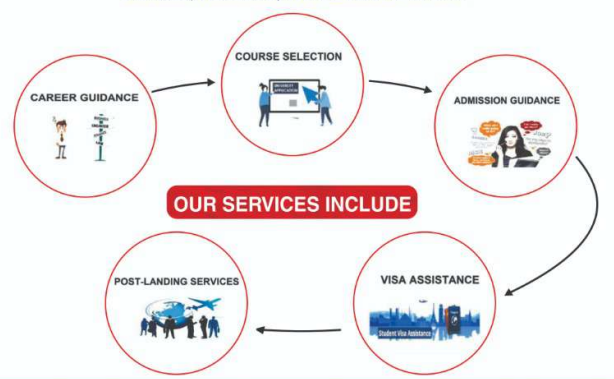Start Your Study Abroad Experience With Us
Studying abroad can be an incredibly enriching experience, both academically and personally. It offers you the opportunity to immerse yourself in a different culture, gain new perspectives, and develop independence and resilience. Whether you're interested in learning a new language, exploring different academic disciplines, or simply experiencing life in a different part of the world, studying abroad can open doors to new possibilities and broaden your horizons.
When considering studying abroad, it's essential to research your options thoroughly. Look into the programs offered by your university or other institutions, consider the location, the courses available, and the cultural experiences you'll have. Additionally, think about practical aspects like cost, visa requirements, and any potential language barriers.
Once you've decided to study abroad, make the most of your experience by fully immersing yourself in the local culture, trying new things, and stepping out of your comfort zone. Take advantage of opportunities to travel, meet new people, and engage with your surroundings. Keep an open mind and be willing to adapt to different ways of life.
Overall, studying abroad can be a transformative experience that not only enhances your academic and professional skills but also helps you grow as a person. It's a chance to expand your worldview, build connections across cultures, and create lasting memories that will stay with you long after you return home.
Certainly! Let's delve deeper into some key aspects of studying abroad:
Academic Opportunities: Studying abroad offers access to a diverse range of academic programs and disciplines that may not be available in your home country. Whether you're interested in a particular field of study, want to explore new subjects, or seek specialized courses, studying abroad can broaden your academic horizons and provide unique learning opportunities.
Cultural Immersion: One of the most significant benefits of studying abroad is the opportunity to immerse yourself in a different culture. Living in a foreign country allows you to experience everyday life from a new perspective, interact with locals, and engage in cultural activities and traditions. This immersion fosters cross-cultural understanding, empathy, and appreciation for diversity.
Language Acquisition:Studying abroad is an excellent way to enhance your language skills by practicing and using the local language on a daily basis. Whether you're enrolled in language courses or simply conversing with locals, immersion in a linguistic environment accelerates language learning and improves proficiency. Bilingualism or multilingualism is not only valuable for personal growth but also enhances employability in an increasingly globalized world.
Personal Growth and Independence: Living in a foreign country challenges you to step out of your comfort zone, adapt to new surroundings, and navigate unfamiliar situations independently. This experience fosters personal growth, resilience, and self-confidence as you overcome obstacles, embrace diversity, and learn to thrive in diverse environments. Studying abroad encourages self-discovery and empowers you to become more adaptable and culturally competent.
Networking and Global Connections: Studying abroad provides opportunities to build a global network of friends, classmates, professors, and professionals from diverse backgrounds. These connections can lead to lifelong friendships, international collaborations, and career opportunities. Engaging with people from different cultures enhances interpersonal skills, fosters intercultural communication, and broadens your professional network.
Travel and Exploration: Studying abroad offers the chance to explore new destinations, landmarks, and landscapes. Whether it is weekend excursions, cultural trips organized by your host institution, or independent travel adventures, you'll have the opportunity to discover the beauty and richness of your host country and neighboring regions. Traveling while studying abroad enriches your experience, creates lasting memories, and expands your global perspective.
Resume Enhancement: Studying abroad demonstrates initiative, adaptability, and cultural awareness to potential employers, making you a more attractive candidate in today's competitive job market. International experience enhances your resume, showcasing your ability to thrive in diverse environments, work effectively with people from different backgrounds, and communicate across cultures. Employers value the skills and qualities developed through studying abroad, such as independence, problem-solving, and cross-cultural competence.
Overall, studying abroad is a transformative experience that combines academic enrichment, cultural immersion, personal growth, and professional development. It offers a unique opportunity to expand your horizons, broaden your perspective, and create lifelong memories while preparing you for success in an increasingly interconnected world.
EXPENSE OF STUDYING ABROAD
Tuition fees for studying abroad can vary significantly depending on the Country, University, and Program you choose. Generally, tuition fees for international students tend to be higher than those for domestic students.
Here are some factors to consider when estimating tuition fees for studying abroad:
- Location and Country: The cost of tuition fees varies greatly from one country to another. For example, studying in the United States or the United Kingdom tends to be more expensive compared to some European or Asian countries.
- University and Program: Different universities have different fee structures, and certain programs might be more expensive than others. For instance, specialized programs like medicine or engineering might have higher tuition fees compared to humanities or social sciences.
- Scholarships and Financial Aid: Many universities offer scholarships, grants, or financial aid for international students. It's worth researching these options to see if you qualify for any assistance.
- Cost of Living: In addition to tuition fees, you'll also need to consider the cost of living in the country where you'll be studying. This includes expenses like accommodation, food, transportation, and health insurance.
- Currency Exchange Rates: Exchange rates can affect the overall cost of studying abroad, especially if you're paying tuition fees in a different currency.
- Additional Expenses: Don't forget to budget for other expenses such as textbooks, study materials, visa fees, and any other miscellaneous costs associated with studying abroad. To get specific information about tuition fees for studying abroad, it's best to directly consult us about the University or College you're interested.
Choosing a course to study abroad is an exciting but important decision that requires careful consideration. Here are some steps to help you make the right choice:
- Identify Your Interests and Goals: Reflect on your interests, strengths, and career goals. What subjects are you passionate about? What career path do you envision for yourself? Choose a course that aligns with your interests and future aspirations.
- Research Universities and Programs: Look for universities that offer the course you're interested in studying. Consider factors such as the university's reputation, rankings, faculty expertise, facilities, and resources available for students in your field of study.
- Consider Location: Think about where you want to study abroad. Consider factors such as the quality of education, cultural experience, language of instruction, climate, cost of living, and proximity to home. Make sure the location is conducive to your academic and personal growth.
- Review Curriculum and Course Structure: Take a close look at the curriculum and course structure of the programs you're considering. Pay attention to the course content, elective options, practical experience opportunities (such as internships or research projects), and any specialized tracks or concentrations offered.
- Check Accreditation and Recognition: Ensure that the university and the course you choose are accredited and recognized internationally. This is important for the validity and acceptance of your degree in your home country and beyond.
- Evaluate Admission Requirements: Review the admission requirements for the course and university, including academic qualifications, language proficiency tests (such as TOEFL or IELTS), letters of recommendation, and any additional application materials required.
- Consider Financial Factors: Evaluate the cost of tuition fees, living expenses, and other related costs associated with studying abroad. Explore scholarship opportunities, financial aid options, and part-time job prospects to help finance your education.
- Seek Advice and Guidance: Talk to current students, alumni, academic advisors, and study abroad counselors for insights and advice on choosing the right course and university. They can provide valuable perspectives and recommendations based on their experiences.
- Trust Your Instincts: Ultimately, trust your instincts and choose a course and university that feels like the best fit for you academically, culturally, and personally. Remember that studying abroad is not just about academics but also about personal growth, cultural immersion, and building lifelong experience.


